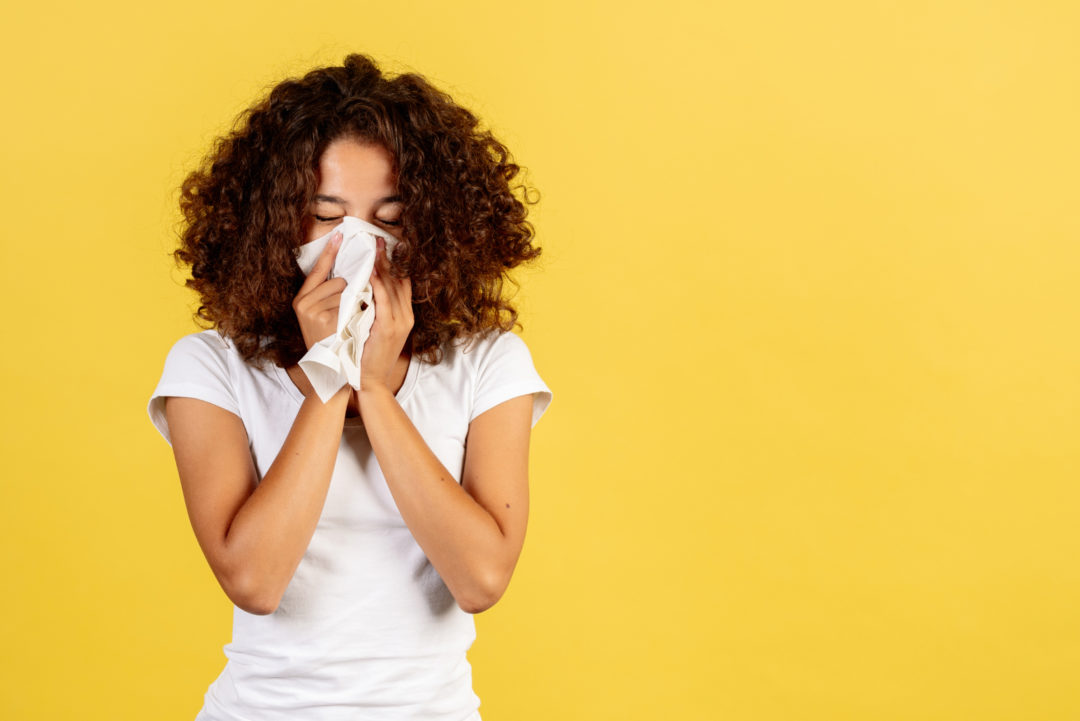Seasonal allergy season is upon us, and expert analysis suggests we should be preparing for a rough one. According to experts from Harvard T.H. Chan School of Public Health’s Department of Environmental Health, seasonal allergies are getting worse as temperatures climb. Harvard’s experts explain that excess carbon dioxide in the Earth’s atmosphere, which is a result of burning fossil fuels and a driver of extreme heat, leads allergenic plants to produce more pollen for longer. For the quarter of American adults who battle allergies, that excess pollen can exacerbate the misery. They stress that system-level solutions to climate change and its health impacts are needed. That said, allergy sufferers can take action to help manage their symptoms.
Antihistamines are commonly used to treat allergy symptoms, but Fred Pescatore, M.D., advises caution, as they can come with unwanted side effects. In April showers bring… more allergies?! he explains, “For example, first-generation antihistamines, such as diphenhydramine, have been linked to drowsiness, dry mouth and eyes, blurred or double vision, dizziness, headaches, low blood pressure, rapid heart rate, difficulty urinating, and constipation. And second-generation antihistamines, such as loratadine, aren’t much better. Side effects can include headache, cough, sore throat, abdominal discomfort, nausea or vomiting, and tiredness.”
There are several strategies that natural health experts recommend. “By avoiding triggers, supporting the immune and digestive systems, decreasing inflammation, and consuming natural antihistamines, we can see substantial improvements in allergy symptoms,” says Emily Martin, N.D., in Preventing and Treating Your Child’s Seasonal Allergies.
Dr. Pescatore advises taking probiotics daily, pointing to a 2015 meta-analysis of 23 randomized trials in which probiotics were shown to reduce the severity of symptoms in people with allergic rhinitis. Also recommending probiotics, Uma Nadoo, M.D., author of Calm Your Mind With Food, explains, “Probiotics (good bacteria) and prebiotics (fiber that feeds these bacteria) help maintain a healthy gut environment. A balanced gut microbiota can reduce the overactivation of the immune system, which is often responsible for allergic reactions.”
Vitamin D is another staple. “As you know, vitamin D is a powerful nutrient that plays an essential role in many physiological processes,” Dr. Pescatore explains. “And some studies suggest it even affects how your body reacts to allergens, like pollen. In a 2017 review, researchers found a link between low vitamin D and an increased risk of allergic rhinitis. In other words, increasing vitamin D may be an effective strategy for managing symptoms. As always, make sure you supplement with 250 mcg (10,000 IU) of vitamin D3 daily.”
Vitamin C is also on the list. “Vitamin C is a powerful antioxidant that helps mitigate the inflammatory response associated with allergies,” says Dr. Nadoo. “It can reduce the production of histamines, the compounds that trigger allergy symptoms, and alleviate symptoms such as sneezing and a runny nose.”
Looking at herbs, Dr. Pescatore says, “Herbal remedies have been used for centuries to treat allergies. One of the best is butterbur. In fact, a 2017 review of 12 randomized-controlled trials found that butterbur effectively reduces the sneezing and stuffiness associated with allergic rhinitis. And another controlled trial found it worked as well as cetirizine—a popular OTC allergy medication—in combating seasonal allergies.”
Dr. Nadoo’s herbal picks: “Certain herbs and spices like turmeric, ginger, and garlic have natural anti-inflammatory and immune-modulating properties. Curcumin, found in turmeric, for instance, has been studied for its potential to alleviate allergy symptoms by inhibiting the release of histamines and suppressing inflammation.”
For a natural antihistamine, Dr. Martin recommends quercetin. “This is a bioflavonoid found in most red, green, and purple fruits and vegetables, including apples, berries, tomatoes, and leafy greens,” she notes. “It is also available in supplement form.”
Several branded ingredients are also study-backed for allergy relief. For example, the lactic acid bacteria L-92 from Maypro is a patented, powdered food ingredient shown in placebo-controlled human clinical research to provide seasonal support for the health of the nasal mucosa and demonstrate improvement in immune parameters and immune expression. The company shared, “During allergy season, L-92 supplementation promotes relief of congestion and ocular symptoms common with seasonal illnesses.”
Gencor shared the news of a human clinical trial demonstrating its palmitoylethanolamide (PEA) ingredient, Levagen+, to be a safe and effective supplement to ease seasonal allergies. As the company explained, in a double-blind, randomized, placebo-controlled clinical trial included 101 participants with seasonal allergies, supplementing with 350 mg of PEA (Levagen+) daily for two weeks lead to a significant reduction in plasma histamine levels compared to the placebo, with a decrease in allergy symptoms such as a blocked nose.
Health Canada has licensed 10 health claims for Cargill’s EpiCor postbiotic, related to the ingredient's role in supporting immune and digestive health. The licensed claims include “Helps to reduce the symptoms of seasonal allergies such as nasal stuffiness/congestion,” “Helps relieve nasal stuffiness/congestion associated with seasonal allergies,” and “Helps to maintain immune function.”
Of course, one should consult their personal healthcare provider, and they can come to the conversation armed with information on the natural allergy easers that experts recommend. WF










